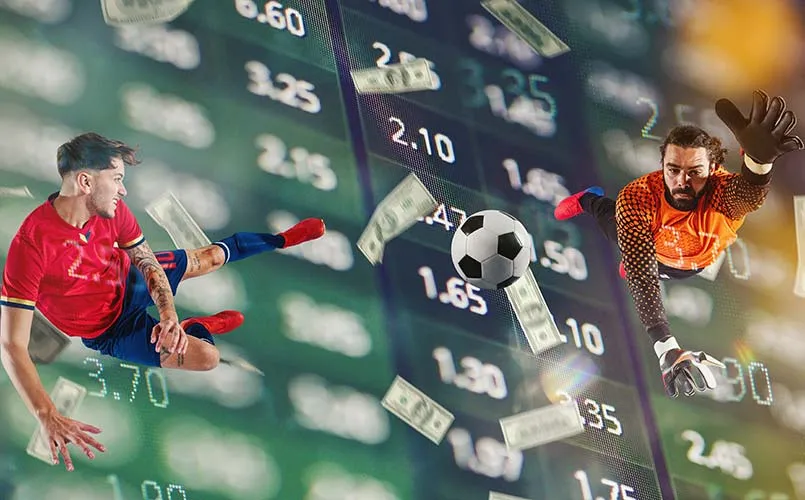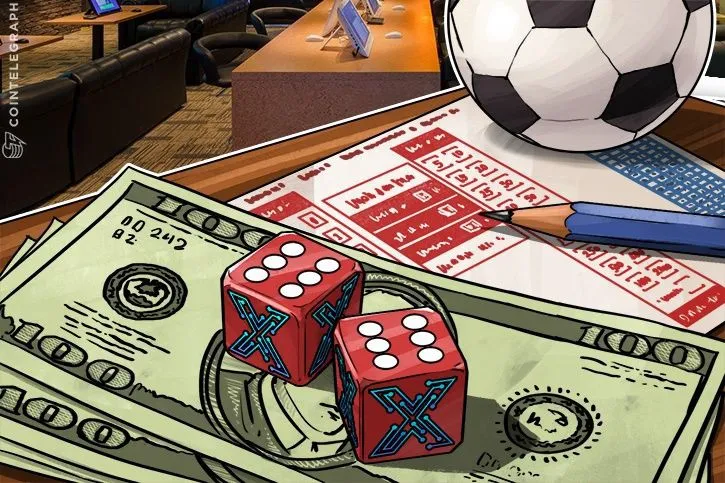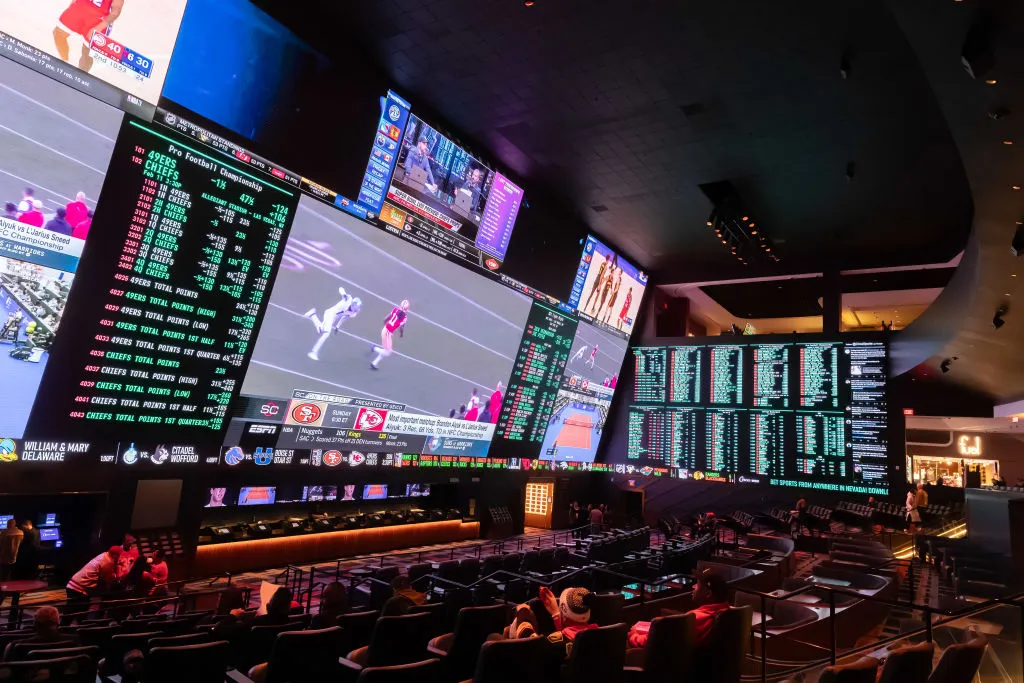
In recent years, the world of professional sports has been rocked by a series of scandals involving athletes engaging in illegal betting activities. From tennis to soccer to cricket, athletes have been caught using their inside knowledge and influence to place bets on games and matches they were involved in. The rise of online gambling and the growing popularity of sports betting have made it easier than ever for athletes to succumb to the temptation of placing bets on themselves or their teams. This has not only resulted in severe consequences for the individuals involved, but it has also raised questions about the integrity of professional sports as a whole.
The combination of high-stakes gambling and professional athletics is a risky one, with the potential for devastating consequences. In this article, we will delve into the world of athletes, sports betting, and the nightmare scenario that can unfold when these elements collide. We will examine the reasons behind this dangerous trend, the impact it has on the sports industry, and what measures can be taken to prevent it from happening.

The Rise of Online Gambling and Its Impact on Athletes
With the advent of the internet, gambling has become more accessible and convenient than ever before. Online betting platforms have made it possible for people to place bets on sports events from the comfort of their own homes, with just a few clicks of a button. This ease of access has also extended to professional athletes, who have been known to use their smartphones or laptops to place bets on games they are involved in.
The anonymity and convenience of online gambling make it an attractive option for athletes looking to engage in illegal betting activities. They can place bets without attracting the attention of the public or their team officials, making it seem like a harmless activity. However, the consequences of their actions can be far-reaching and have a detrimental impact on their careers and the sports industry as a whole.
Subheading 1: The Rise of Mobile Betting Apps
One of the main reasons behind the increase in athletes engaging in illegal betting activities is the rise of mobile betting apps. These apps allow users to bet on sports events from anywhere, at any time, making it easy for athletes to do so even while on the road for games. It also provides them with a sense of privacy, as they can place bets discreetly without anyone knowing.
Mobile betting apps are designed to be user-friendly, with attractive interfaces and enticing bonuses, making it all the more tempting for athletes to engage in sports betting. With just a few taps on their screens, they can place bets on their own performances or the outcome of their team’s matches, leading to potential conflicts of interest and jeopardizing the integrity of the game.
Subheading 2: The Influence of Social Media
In addition to mobile betting apps, social media has played a significant role in the rise of sports betting among athletes. Platforms such as Twitter and Instagram have become breeding grounds for illegal betting activities, with athletes sharing tips, predictions, and even placing bets publicly. This has normalized the idea of athletes engaging in sports betting, making it seem like a harmless form of entertainment rather than a serious issue.
Moreover, social media has made it easier for athletes to connect with bookmakers and betting syndicates, who often target high-profile athletes with lucrative offers. This further increases the allure of sports betting and can lead to athletes getting involved in illegal activities without fully understanding the consequences.
The Temptation of Placing Bets on Yourself or Your Team
One of the main reasons why athletes engage in sports betting is the temptation of placing bets on themselves or their teams. Professional sports are high-stakes, and the pressure to perform and win can be immense. When the opportunity presents itself, it can be hard for athletes to resist the urge to bet on themselves or their team to succeed.
Subheading 1: The Desire for Financial Gain
At its core, sports betting is a form of gambling, and like any other form of gambling, the potential for financial gain is a significant motivator for athletes. With high salaries and endorsement deals, one might wonder why professional athletes would risk everything for a few extra bucks. However, the desire for more money is a never-ending cycle, and even the most well-paid athletes can fall into the trap of chasing bigger wins through sports betting.
Furthermore, the rise of online betting platforms has made it possible for athletes to place bets with different bookmakers, increasing the potential for financial gain. They may also be tempted by the possibility of receiving inside information from bookmakers, which could give them an unfair advantage over their opponents.
Subheading 2: The Thrill of Winning
For athletes, winning is everything. It’s what they train for, what they strive for, and what they live for. The thrill of winning can be addictive, and when combined with the adrenaline rush of gambling, it can be hard for athletes to resist the temptation of placing bets on themselves or their team.
The belief that placing a bet on yourself or your team will motivate you to perform better is a common misconception among athletes. In reality, it can have the opposite effect, leading to increased pressure and anxiety, which can affect their performance on the field. This can also create conflicts of interest, as athletes may prioritize their personal financial gain over the success of their team.
Inside Knowledge and Influence: The Danger of Insider Betting
One of the most significant dangers of athletes engaging in sports betting is the potential for insider betting. As professional athletes, they have access to insider information about their teams, opponents, and games. This inside knowledge can give them an unfair advantage when placing bets, and if used for personal gain, it can have severe consequences.
Subheading 1: Match-Fixing and Spot-Fixing
One of the most alarming forms of insider betting is match-fixing and spot-fixing. Match-fixing involves manipulating the outcome of a game, while spot-fixing involves fixing certain aspects of a game, such as the number of runs scored or the number of yellow cards given. In both cases, the involvement of insiders, such as athletes, can make it easier to execute these illegal activities.
When athletes engage in match-fixing or spot-fixing, it not only compromises the integrity of the game but also puts their safety at risk. They may be approached by bookmakers or betting syndicates who threaten them or their family members, forcing them to comply with their demands. This can lead to a dangerous and potentially life-threatening situation for the athletes involved.
Subheading 2: Insider Trading and Inside Information
In addition to match-fixing and spot-fixing, insider betting can also take the form of insider trading and using inside information to place bets. Insider trading involves using privileged information to buy or sell stocks or securities, while using inside information for sports betting involves using confidential information about a game or event to place bets.
For example, an athlete may know that a key player on the opposing team will not be playing due to an injury, giving them an advantage when placing bets on their team to win. This type of insider betting can also extend to coaches, managers, and other team officials who have access to insider information and can use it for personal gain.
The Consequences of Athletes Engaging in Illegal Gambling Activities

The consequences of athletes engaging in illegal gambling activities can be severe, both for the individuals involved and for the sports industry as a whole. Apart from the potential legal ramifications, it can also lead to reputational damage, financial losses, and even bans or suspensions from their respective sports leagues.
Subheading 1: Legal Ramifications
In most countries, sports betting is illegal, and athletes caught engaging in such activities can face severe legal consequences. They may be charged with fraud, conspiracy, or match-fixing, depending on the severity of their actions. In some cases, they may also face jail time and hefty fines, which can have a long-lasting impact on their careers and personal lives.
Furthermore, athletes may also face disciplinary action from their respective sports organizations, which could result in suspensions or bans from playing. This not only affects their livelihood but can also tarnish their reputation and credibility within the sports community.
Subheading 2: Reputational Damage
For professional athletes, their reputation is everything. It’s what sets them apart from their peers and makes them attractive to sponsors and fans. However, when news breaks out that an athlete has been involved in illegal gambling activities, it can have a devastating impact on their reputation and their career.
Athletes are often considered role models for young fans, and their actions, both on and off the field, are closely scrutinized. When they engage in activities such as sports betting, it sends the wrong message to their fans and can damage their image as a respectable and responsible individual.
The Impact on the Integrity of Professional Sports
The rise of illegal gambling activities among athletes has had a significant impact on the integrity of professional sports. It has raised doubts about the fairness and authenticity of games and events, leading to a loss of trust among fans and sponsors. This can have far-reaching consequences for the sports industry as a whole.
Subheading 1: The Loss of Trust from Fans
Fans are the backbone of professional sports. They are the ones who buy tickets, merchandise, and tune in to watch games and matches. However, when the integrity of the game is compromised, it can lead to a loss of trust from fans. If they feel that games are rigged or players are not playing to their full potential due to illegal betting activities, they may lose interest in the sport altogether.
Moreover, betting scandals also tarnish the image of the entire sports industry. It creates the perception that professional sports are corrupt and that athletes are only in it for personal gain. This can have a long-lasting impact on the popularity and profitability of sports leagues and organizations.
Subheading 2: The Impact on Sponsorships and Advertisements
The negative publicity surrounding athletes engaging in illegal gambling activities can also have a detrimental impact on sponsorships and advertisements. Companies are often hesitant to associate their brand with individuals or teams involved in scandals, as it can damage their own reputation and credibility.
This also affects the financial stability of sports leagues and organizations, as sponsorships and advertisements are a significant source of revenue. If sponsors and advertisers pull out due to concerns about the integrity of the game, it can have a domino effect on the entire industry, leading to financial losses and instability.
Measures to Prevent Athletes from Falling into the Trap of Sports Betting

To prevent athletes from engaging in illegal gambling activities, several measures have been put in place by sports organizations, government agencies, and law enforcement. These measures are aimed at educating athletes about the dangers of sports betting, providing support for those who may be struggling with addiction, and implementing strict regulations to deter such activities.
Subheading 1: Education and Awareness Programs
One of the most effective ways to prevent athletes from falling into the trap of sports betting is through education and awareness programs. These programs are designed to educate athletes about the dangers of illegal gambling, the potential consequences for their actions, and how to seek help if they find themselves struggling with addiction.
Sports organizations and government agencies also work together to provide resources and support for athletes who may be at risk of engaging in illegal betting activities. This includes counseling services, financial management programs, and communication channels for reporting any suspicious activities.
Subheading 2: Strict Regulations and Penalties
To deter athletes from engaging in sports betting, strict regulations and penalties have been put in place by sports organizations and government agencies. These regulations often include bans or suspensions for athletes caught taking part in illegal betting activities, as well as financial penalties and other disciplinary actions.
Moreover, law enforcement agencies also work closely with sports organizations to identify and prosecute individuals involved in match-fixing and other forms of illegal gambling. The fear of facing legal repercussions can act as a deterrent for athletes and discourage them from engaging in such activities.
Conclusion
The combination of high-stakes gambling and professional athletics can be a recipe for disaster. The rise of online gambling, the temptation of placing bets on yourself or your team, and the danger of insider betting have all contributed to a growing trend of athletes engaging in illegal gambling activities. The consequences of their actions not only affect their own careers but also have a detrimental impact on the integrity of professional sports.
Strict regulations, education programs, and the implementation of preventive measures are crucial in preventing athletes from succumbing to the temptation of sports betting. By working together, sports organizations, government agencies, and law enforcement can ensure that the nightmare scenario of athletes engaging in illegal gambling activities does not become a reality.


